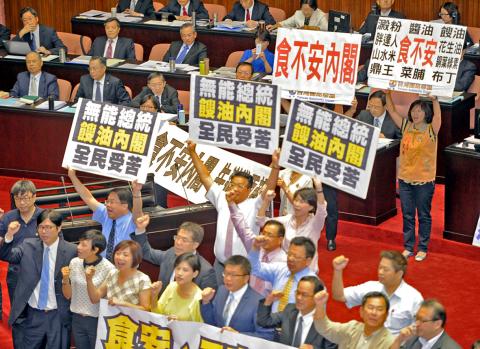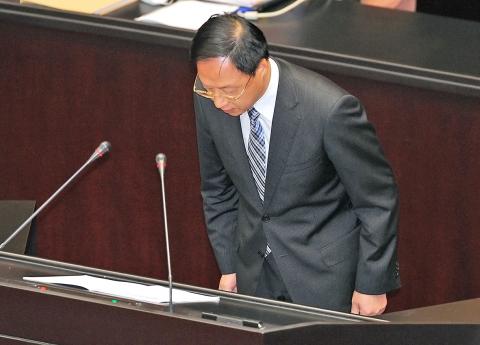Premier Jiang Yi-huah (江宜樺) apologized to the public for the lard oil scandal after opposition parties boycotted his scheduled policy address yesterday morning on the first day of the new legislative plenary session. He again apologized in the afternoon during his policy address.
Democratic Progressive Party (DPP) and Taiwan Solidarity Union (TSU) legislators occupied the podium on which Jiang planned to present his policy address yesterday morning.
DPP lawmakers held up banners calling for Jiang to apologize and for Minister of Health and Welfare Chiu Wen-ta’s (邱文達) resignation, saying that food safety, safety in the construction industry and national security have been neglected during their terms.

Photo: CNA
They also called for the setting up of a document-requesting committee in the legislature.
TSU lawmakers’ banners read: “The public suffers because of an impotent president and a recycled waste oil Cabinet” and “Apologize first, report later.”
Chinese Nationalist Party (KMT) legislators were well prepared as well, holding up placards asking the opposition to stop obstructing legislative procedure.

Photo: Liao Chen-huei, Taipei Times
The standoff led to a closed-door cross-party negotiation, which had failed to reach a consensus by the end of the morning.
Jiang, when leaving the chamber for the noon recess without having made his policy address, was stopped by reporters and it was then that he first uttered his apology.
He said he was infuriated by a few food manufacturers or related businesses who sacrificed the health of the public and the nation’s reputation for the sake of their own profits.
“I’m here to offer my apology, as a representative of the government, to the public for the food scares over the past two years that have caused grave concern and dissatisfaction with all levels of government for the lack of its ability to secure food safety,” he said.
Jiang made the same apology again in the legislature when he made his policy address in the afternoon, during the first five minutes of which TSU legislators again raised their placards, prompting criticism from KMT legislators.
The apology was not offered at the beginning of the presentation, but during the premier’s policy address, which covered seven major policies on population, state-owned land, education, industry, social welfare, culture and health.
After bowing, Jiang said that companies found guilty of illegal actions would be severely punished and that the Executive Yuan had established a special task force to coordinate the response of different ministries and departments to the tainted lard oil case.

NATIONAL SECURITY THREAT: An official said that Guan Guan’s comments had gone beyond the threshold of free speech, as she advocated for the destruction of the ROC China-born media influencer Guan Guan’s (關關) residency permit has been revoked for repeatedly posting pro-China content that threatens national security, the National Immigration Agency said yesterday. Guan Guan has said many controversial things in her videos posted to Douyin (抖音), including “the red flag will soon be painted all over Taiwan” and “Taiwan is an inseparable part of China,” while expressing hope for expedited “reunification.” The agency received multiple reports alleging that Guan Guan had advocated for armed reunification last year. After investigating, the agency last month issued a notice requiring her to appear and account for her actions. Guan Guan appeared as required,

A strong cold air mass is expected to arrive tonight, bringing a change in weather and a drop in temperature, the Central Weather Administration (CWA) said. The coldest time would be early on Thursday morning, with temperatures in some areas dipping as low as 8°C, it said. Daytime highs yesterday were 22°C to 24°C in northern and eastern Taiwan, and about 25°C to 28°C in the central and southern regions, it said. However, nighttime lows would dip to about 15°C to 16°C in central and northern Taiwan as well as the northeast, and 17°C to 19°C elsewhere, it said. Tropical Storm Nokaen, currently

‘NATO-PLUS’: ‘Our strategic partners in the Indo-Pacific are facing increasing aggression by the Chinese Communist Party,’ US Representative Rob Wittman said The US House of Representatives on Monday released its version of the Consolidated Appropriations Act, which includes US$1.15 billion to support security cooperation with Taiwan. The omnibus act, covering US$1.2 trillion of spending, allocates US$1 billion for the Taiwan Security Cooperation Initiative, as well as US$150 million for the replacement of defense articles and reimbursement of defense services provided to Taiwan. The fund allocations were based on the US National Defense Authorization Act for fiscal 2026 that was passed by the US Congress last month and authorized up to US$1 billion to the US Defense Security Cooperation Agency in support of the

PAPERS, PLEASE: The gang exploited the high value of the passports, selling them at inflated prices to Chinese buyers, who would treat them as ‘invisibility cloaks’ The Yilan District Court has handed four members of a syndicate prison terms ranging from one year and two months to two years and two months for their involvement in a scheme to purchase Taiwanese passports and resell them abroad at a massive markup. A Chinese human smuggling syndicate purchased Taiwanese passports through local criminal networks, exploiting the passports’ visa-free travel privileges to turn a profit of more than 20 times the original price, the court said. Such criminal organizations enable people to impersonate Taiwanese when entering and exiting Taiwan and other countries, undermining social order and the credibility of the nation’s